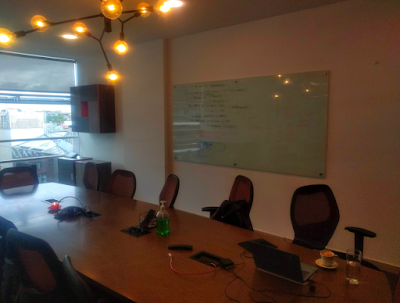[Listen to an audio version of this blog entry here.]
As the old adage goes, 'never say never.'
So while I have let it be known that over the years I've grown quite tired of freelance English teaching since I first started such work in 2012, I don't think I actually ever said that I would never return to it.
 |
| A fresher-faced Wrong Way, um, spreading knowledge back in 2012. |
Face time
Nonetheless, having, since 2018, largely left behind the travelling teacher gig — travelling from class to class across Bogotá that is, and usually spending more time getting to classes than giving them — the thoughts of going back to that lifestyle are anathema to me.OK, those in the Teaching-English-as-a-foreign-language (Tefl) industry will point to the fact that the pandemic has largely eliminated the need for the peripatetic preceptor. Online sessions now appear to have become the norm.
From the perspective of a teacher with multiple clients/students in different companies — the market I'm specifically referring to here — why rush around Bogotá or wherever when classes can be conducted from a fixed point, staring into a computer screen?
'I want virtual sessions to end as soon as they begin.'Virtual classes allow for far more teaching time as there's no travel involved. With that, potentially anyway, there's more scope to earn money.
I, however, prefer the face-to-face approach. I've found giving lessons over the internet to be more draining than the traditional method. I generally want virtual sessions to end as soon as they begin. (A strong dislike of working from home — I've yet to have accommodation in Bogotá that I'd truly call my "home" — does play a part in this mindset.)
Call me, um, old-school if you like, but I enjoy being able to stand up, walk around the class, nay meeting room, and make use of a whiteboard.
Putting all that together, and barring a complete collapse in my personal finances, the only way I could return with a degree of enthusiasm to teaching English is with a well-remunerated, fixed-term, part-time deal (Wrong Way does need time to nourish his own brand), preferably with a reputable company.
That is to say, an arrangement where a price for the service is agreed on before commencement. The pay-per-class model, particularly when it's the student forking out and not his/her company, is usually not a steady source of income.
'Qualification is a result, education a process.'This, what I consider a more attractive teaching proposition — in-person, relatively well-paid and "guaranteed" by a company — is what I've recently signed up to. The first payment date has yet to pass, so until the money is firmly in my account I'll hold off on congratulating myself for my negotiating skills.
Yet, somewhat nervously, I have already started. So after over four years, I'm back giving in-person classes to business professionals.
The difference now is that it's mainly on my terms. There's no intermediary institute or the like cashing in on my endeavours. (To repeat, the first payment is pending, so I write cautiously here.)
Now, lest I be accused of adopting nothing more than mercenary methods for work that requires plenty of enthusiasm and passion, not to mention know-how, I'm not merely in it for the money, just going through the motions.
For one, it's a 20-kilometre round-trip from my apartment to the office. That's a bit outside my comfortable walking zone, especially when one has to lug a laptop around. Once I've received the first payment, the plan is to buy a decent bike. (I do have access to one but it's not the most efficient of two-wheelers. Put it this way, it doesn't entice one to ride it.)
 |
| The new part-time office. It's due to pay off a bit better that the panadería. |
Educational excellence
In a more general sense, it does beg the question, are some people just ill-equipped to learn a foreign language? Most cognitive experts would answer that in the negative.It isn't that there are those who simply can't acquire another tongue because their brains are "wired differently". In many instances, it comes down to the learner's desire. If there is a real need then most likely he/she will learn. Necessity is the mother of invention, after all.
For sure, teachers — or as I like to call them, facilitators/guides — play an important role in this, too. They have to know their "brief" for starters.
Creating the right pedagogical environment and following a method that best suits the student's learning capacities are other factors. One-to-one instruction allows for greater flexibility for both of these compared to classes in big groups.
For me, that's the key. Flexibility. What works for one student may not work for another. I like to think that I do have this adaptability.
I do, however, sometimes receive criticism from qualified English teachers because I'm not 'a real one.' My retort: What is a "real" teacher?
In my school-going days, I had numerous "qualified" teachers who appeared quite inept at imparting the knowledge that they had learned. They certainly weren't figures of inspiration.
Again, one does have to know the nuts and bolts of the subject in question before he/she can teach it but simply having this knowledge doesn't mean one can easily pass it on to others. Not all gifted sports stars go on to become great coaches, after all.
This is a danger with qualifications and the weight they often carry. One feels one has "made it", so to put it, on receiving the piece of paper to hang on the wall.
Yet, qualification is a result, education a process. Learning, after all, only ends at death.
_______________________________________________________________
Listen to Wrong Way's Colombia Cast podcast here.
Facebook: Wrong Way Corrigan — The Blog & IQuiz "The Bogotá Pub Quiz".
No comments:
Post a Comment